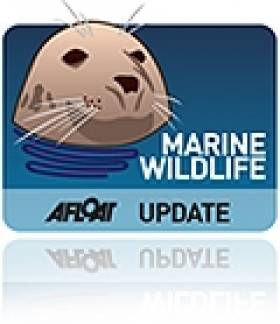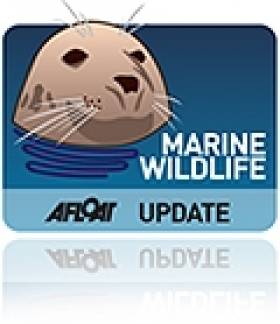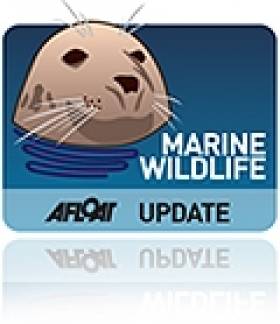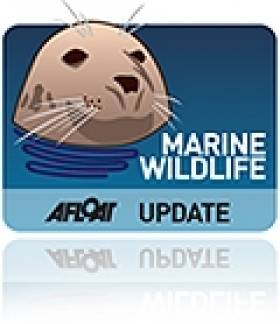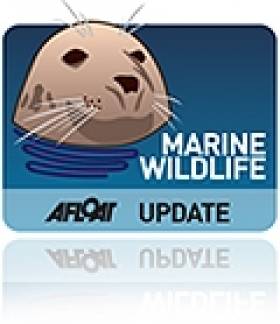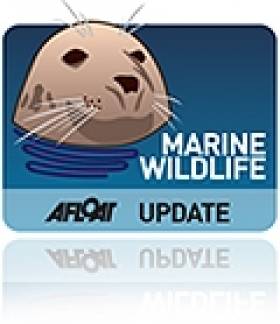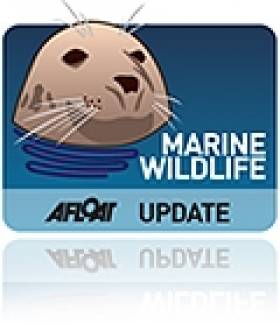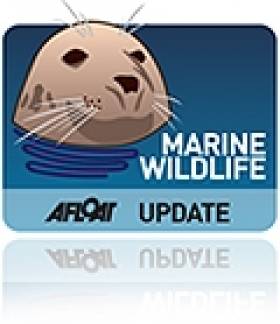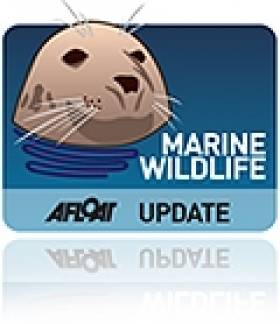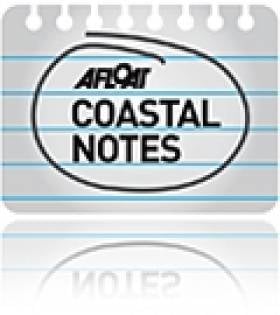Displaying items by tag: Irish Whale and Dolphin Group
Mystery of Missing 'Narwhal' in Clare is Solved
#MARINE WILDLIFE - The mystery disappearance of an allegedly rare whale carcass from a Co Clare beach last week has been solved.
As The Irish Times reports, Clare County Council admitted yesterday that the "badly decomposed whale" was removed from Liscannor beach "due to public health concerns".
The vanishing of the creature had been a source of puzzlement to the Irish Whale and Dolphin Group (IWDG), after scientists dispatched to examine the carcass found no trace on arrival.
Experts had been hoping to verify whether the carcass was indeed that of a narwhal, an Arctic cetacean renowned for its unicorn-like tusk.It would have been the first recorded sighting of a narwhal in Irish waters.
Max Halliday from Shannon, who reported the find to the IWDG, said he was "convinced that what I saw is a narwhal. It had the long tusk protruding from its head, but its head was badly damaged. I am absolutely mad that I didn't take a photo."
According to the Irish Independent, the IWDG had appealed to those responsible for removing the whale to get in touch so the remains could be transferred to the Natural History Museum.
But it has since emerged that the creature was taken to a rendering plant in Derry by a team contracted by the council.
A spokesperson for Clare County Council said no remains of a tusk were found in the removal operation.
Humpback Whales A Surprise April Sighting Off West Cork
#MARINE WILDLIFE - At least two humpback whales have been spotted by birdwatchers off Galley Head in West Cork, according to the Irish Whale and Dolphin Group (IWDG).
"This is the first time since the large whale project commenced in 1999 that humpback whales have been recorded along the Irish south or coast during April, which has been up till now the one month in which large whales have consistently been absent from our inshore waters," said IWDG sightings co-ordinator Pádraig Whooley.
The timing of this sighting was described by Whooley as "unusual". He also confirmed that one of the whales was recorded off Hook Head in Co Wexford in late January and early February of this year, which dispells the hypothesis that large whales leave Irish waters after the herring season in the southeast.
Meanwhile, Whooley sounded a word of caution for anyone hoping to spot the humpbacks for themselves, as the "sheer numbers of basking sharks about" often result in false sightings.
The Irish Whale and Dolphin Group has more on the story, including images, HERE.
Killer Whale Pair Spotted Near Kinsale
#MARINE WILDLIFE - Two killer whales have been spotted near Kinsale in recent weeks, the Irish Whale and Dolphin Group (IWDG) reports.
Two separate sightings of the orca pair near Barry's Head have been confirmed by the group, via photos provided by John Murphy and Richard Cussen on 5 March, during what is normally the 'low season' for whale watching in Ireland.
The pair comprises one adult male and a smaller whale which is likely an adult female. It is not yet known, however, whether the whales are new to Irish or Scottish waters.
According to the IWDG's Pádraig Whooley, it is "interesting that they have stayed close to their original position and suggests they may have found 'rich pickings'".
In other news, the Whale and Dolphin Roadshow will be at the Galway Shopping Centre from 22-25 March in time for the European Cetacean Society Conference.
The roadshow "is a fantastic opportunity to learn more about whales, dolphins and porpoise of the ASCOBANS region" that encompasses the Baltic Sea, Northeast Atlantic and Irish and North Seas.
Whale and Dolphin Strandings On the Rise in 2012
#MARINE WILDLIFE - The rate of cetacean strandings on the Irish coast remains unusually high, according to the Irish Whale and Dolphin Group (IWDG).
The group's Cetacean Stranding Scheme recorded 162 strandings in 2011 which, while numbers do vary from year to year, was 25-30 more than anticipated.
And already this year the numbers are up on last year's 'inexplicable' records for the first quarter.
Some 21 strandings were reported to the IWDG in January alone - the highest ever number recorded for that month, well above the average of 13.
February's figures are even more worrying, with 30 strandings reported this year compared to a five-year average of 11.4.
"As we are now well into 2012, it is clear that the numbers have not returned to what we could have considered to be more normal levels," said the group in a statement.
There is as yet no explanation, whether a single cause or a number of factors, for what might be causing this significant rise in strandings of both live and dead animals, although one curious clue is "the number of carcasses which had washed ashore with tail fluke/fins apparently cut away".
In other IWDG news, the group recently announced the receipt of £2,000 (€2,400) core funding support from Scottish-based veterinary X-ray firm BCF Technology Ltd, which funds a number of charities through its BCF Foundation.
New Season of Summer Whale Watching Courses on Cape Clear
#MARINE WILDLIFE - The Irish Whale and Dolphin Group (IWDG) has announced another series of its popular whale watching courses on Cape Clear in West Cork this summer.
The courses cater for adults keen to learn more about whales and dolphins in Irish waters and how to observe, record and identify them. They will feature a mixture of workshops and field trips, including cliff and boat-based whale watches.
Three weekend courses will take place on 25-27 May, 20-22 July and 7-9 September, led by IWDG sightings co-ordinator Pádraig Whooley. All are open to IWDG members and non-members alike, but places are limited to 20 places each weekend on a first-come-first-served basis.
Admission is €70 for IWDG members (€90 for non-members), with a non-refundable deposit of €25 required. Please note that this fee does not cover transport to Cape Clear, food or accomodation (which is limited in high summer) or any boat trips. As the itinerary will be weather-dependant, some flexibility will be required.
More information on the weekends and booking details are available at the IWDG website HERE.
In other IWDG news, the group has secured another grant from the Island Foundation to continue its humpback whale research in Cape Verde this spring and summer.
A shore-based team will be stationed in Boa Vista in an area that is "possibly the most important site for breeding humbacks in the entire northeast Atlantic".
North Atlantic Killer Whales Feeding on Sunfish Says IWDG
#MARINE WILDLIFE - The Irish Whale and Dolphin Group (IWDG) has recorded another first for the North Atlantic, with evidence showing that killer whales are feeding on ocean sunfish.
Mark Holmes of the Natural History Museum confirmed the presence of parasites unique to the sunfish found within the carcass of a female orca stranded in Doohooma in Co Mayo.
"These parasites did not originate from the whale's stomach, but came from the prey which it had eaten," said the IWDG's Conor Ryan.
"This was confirmed when the partially digested bones in the stomachs were eventually identified as those of a sunfish beak."
The discovery may explain a recent study of UK waters which found sunfish taking unusually deep dives, possibly to avoid cetaceans and other large predators.
President Michael D Becomes Sole Patron of IWDG
#MARINE WILDLIFE - Newly-elected Irish President Michael D Higgins has agreed to be the sole patron of the Irish Whale and Dolphin Group (IWDG).
President Higgins has a long history of supporting environmental causes. In his inaugural speech he referred to Ireland’s strong cultural, scientific and technological ethos.
IWDG chairman Kevin MacCormick welcomed the President’s decision as a strong endorsement of the group’s work in protecting Ireland's marine wildlife.
He stated: “The IWDG will continue to maintain a sense of pride in our extraordinary national marine heritage and our need for stewardship of the natural environment through research, education and conservation policies.”
The IWDG is Ireland’s only conservation group dedicated to protecting whales and dolphins in Irish waters. It celebrated its 21st anniversary in December 2011.
Video of Talk on the 'Mysterious' Basking Shark
#MARINE WILDLIFE - TED have posted video of the Irish Whale and Dolphin Group's Dr Simon Berrow giving a talk on the biggest fish in Ireland's waters, the mysterious basking shark.
The second largest fish in the world, basking sharks are almost extinct, and we know almost nothing about them.
But despite their huge size, we do know that they are among the friendlies of Ireland's marine wildlife.
Recorded at the TEDxDublin event at Dublin's Science Gallery in December 2010, the video above shows Dr Berrow describing the fascinating creature (known as the 'Great Fish of the Sun' in Irish) and the surprisingly low-tech methods he's employing in learning all he can to save them.
Humpback Whale Spotted Off Achill
#MARINE WILDLIFE - The Irish Whale and Dolphin Group has confirmed the sighting of a humpback whale off Achill Island in Co Mayo last weekend.
Surfers off Keel Beach were credited with the discovery, after spotting a large whale of 30-60ft breaking the surface multiple times, lifting its tail fluke vertically.
The sighting is only the fifth validated record of a humpback whale off the coastal area from Galway to Donegal.
"It remains something of a mystery as to why sightings of this species remain such relatively rare events along our west and northwest compared to our south and southwest coasts," says IWDG sightings co-ordinator Pádraig Whooley.
"This latest sighting is a timely reminder that species such as humpbacks can and do turn up in places that are well outside what we perceive to be the known 'hotspots'."
Humpback whales tend to feed in inshore waters, which should make them increasingly easier for the public to spot from the shore, he added.
The IWDG has more on the story HERE.
Dolphin Group Comments on Dalkey Island Prospect
#DALKEY ISLAND PROSPECT - The Irish Whale and Dolphin Group (IWDG) has joined the chorus of opposition to the proposed oil and gas exploration off Dalkey Island in Co Dublin.
As previously reported on Afloat.ie, Providence Resources has applied for a foreshore licence to search for oil or gas about 6km out to sea on the Kish Bank Basin.
But the prospect has provoked a split in the local community over the potential risks and benefits, with many calling for a public enquiry into the licence before it is granted.
This evening an urgent meeting in Dun Laoghaire will address the public's concerns, which have been echoed by the IWDG.
"The Kish Bank and adjacent waters are important for cetaceans," said the group in a statement. "In addition, sightings of bottlenose dolphins have increased dramatically in the area following the presence of a group of three individuals since August 2010."
The IWDG is concerned about the potential effects on dolphins and porpoises that "could due to noise generated from the drilling process", noting that "there is little published data on the intensity and effects of sound generated by drilling".
Protest group Protect Our Coast has launched a online petition against the Dalkey Island Prospect citing concerns over the proximity of the drilling area to the mainland as well as the Special Protection Area of Dalkey Island, which is a haven for marine wildlife.
- Irish Whale and Dolphin Group
- IWDG
- Dalkey Island Prospect
- Coastal Notes
- Dalkey Island
- Dublin
- oil and gas
- exploration
- drilling
- Providence Resources
- foreshore licence
- Kish Bank Basin
- community
- Dun Laoghaire
- bottlenose dolphins
- Porpoises
- Cetaceans
- noise
- sound
- Protect Our Coast
- protest
- petition
- Special Protection Area
- marine wildlife



























